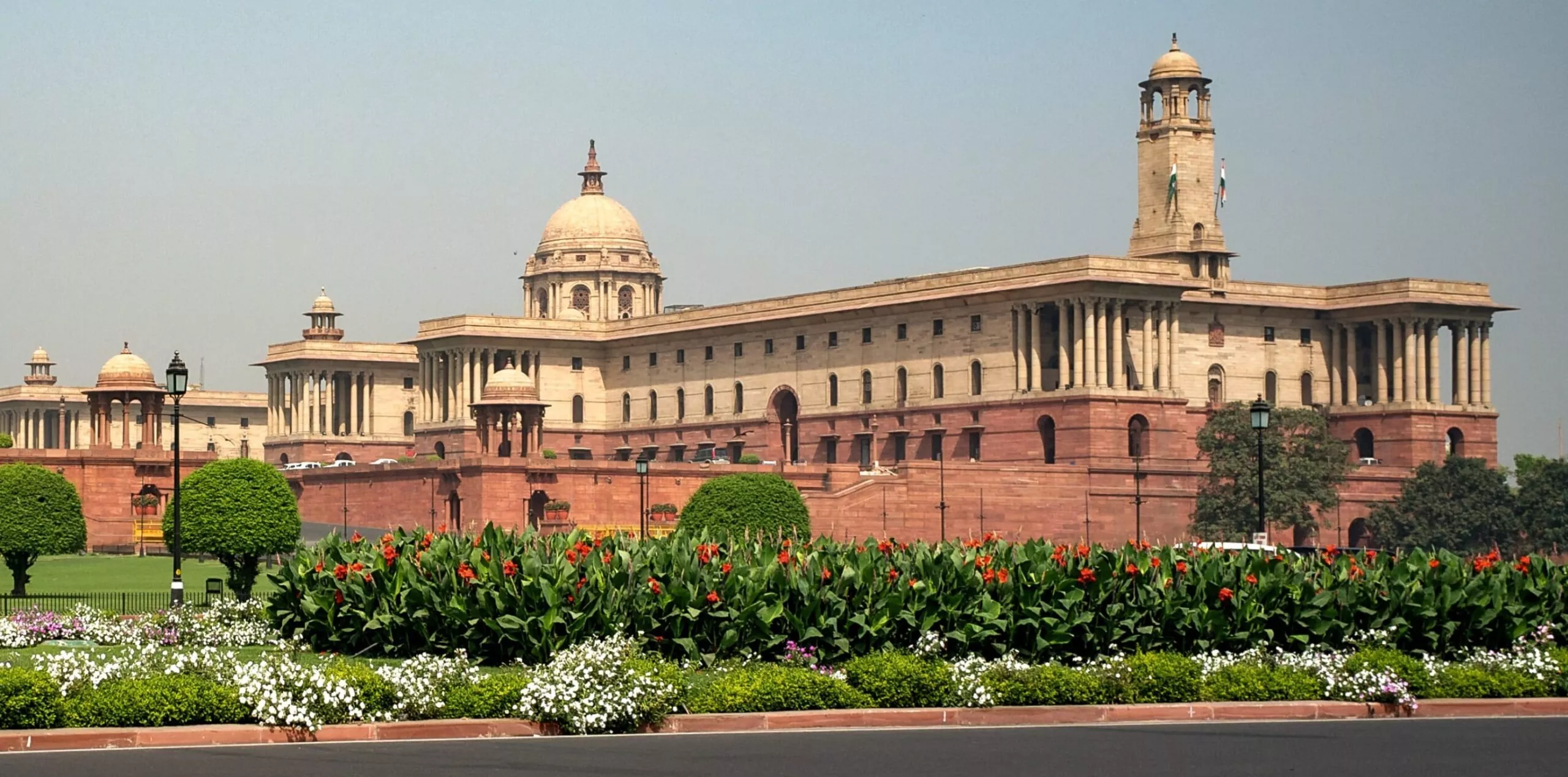This is the final part of the three parts series, which will discuss the Indian startup ecosystem, its regulatory framework, as well as the challenges and risks for investors when it comes to the Indian VC landscape.
This three-part series takes an in-depth look at the Venture Capital landscape in India, with the first part examining the macroeconomic perspective in India and the second part discussing the Indian VC ecosystem. You can read the first part here and second part here.
1. India’s Startup Ecosystem
India has one of the top five startup ecosystems in the world and will continue to grow rapidly in the future.
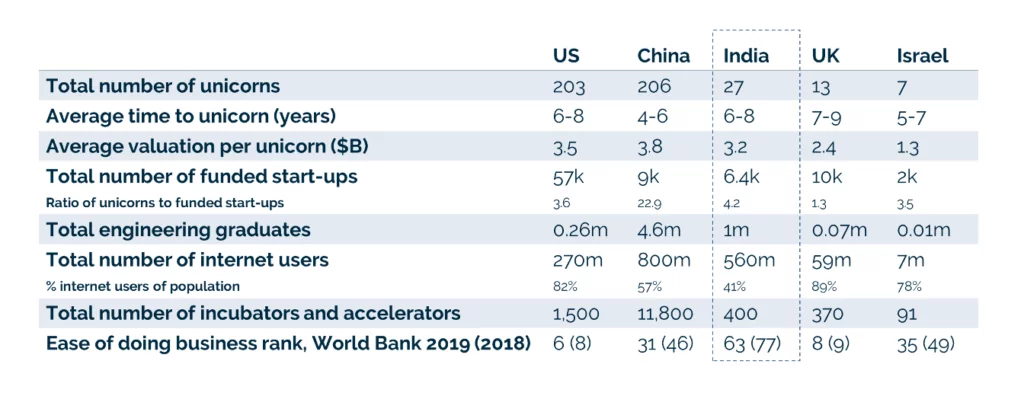
The Indian startup ecosystem is growing at 17% CAGR with about 80,000 startups in total, 8% of which are funded. Among the funded startups in India, typically at least 25% go on to raise subsequent rounds and the number of funded startups is growing at 19% CAGR.
As the share of startups raising over $50 million of capital continues to increase, India is expected to have between 95 – 105 unicorns by 2025, up from 27 in 2019.

Unicorns in India, as of end of 2019.
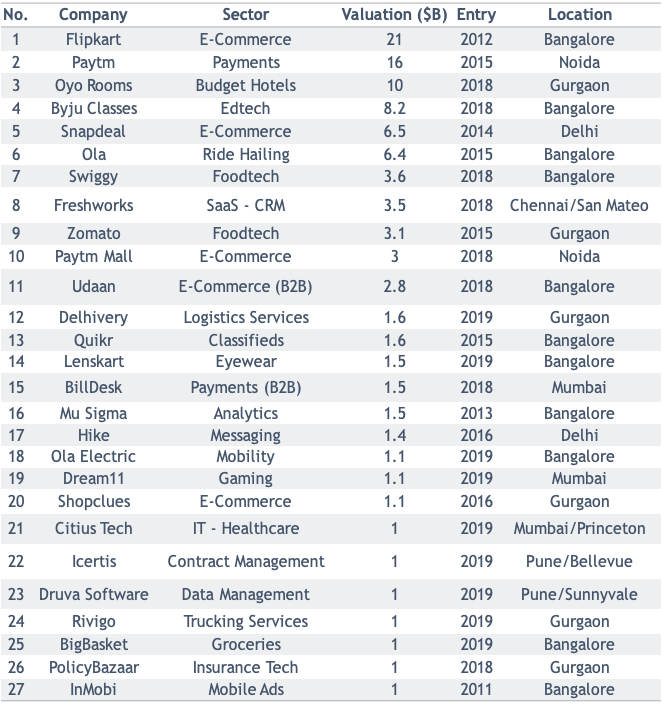
2. Ecosystem Enablers
Great availability of tech talent, a strong macroeconomic base, supportive ecosystem enablers and a strong regulatory push are the main factors contributing to India’s startup boom.
India has the largest young working population in the world (age group 20-39), the second highest annual college enrollments in the world and 50% of India’s college graduates are educated in STEM and business.
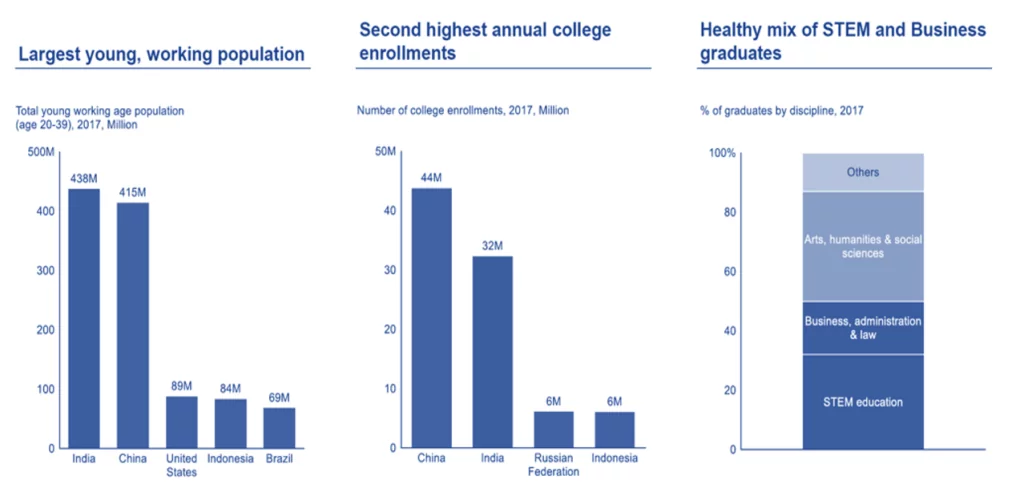
Additionally, India produces more than 1 million engineering graduates each year – second only to China, fuelling startups with the necessary talent for high-paced growth.
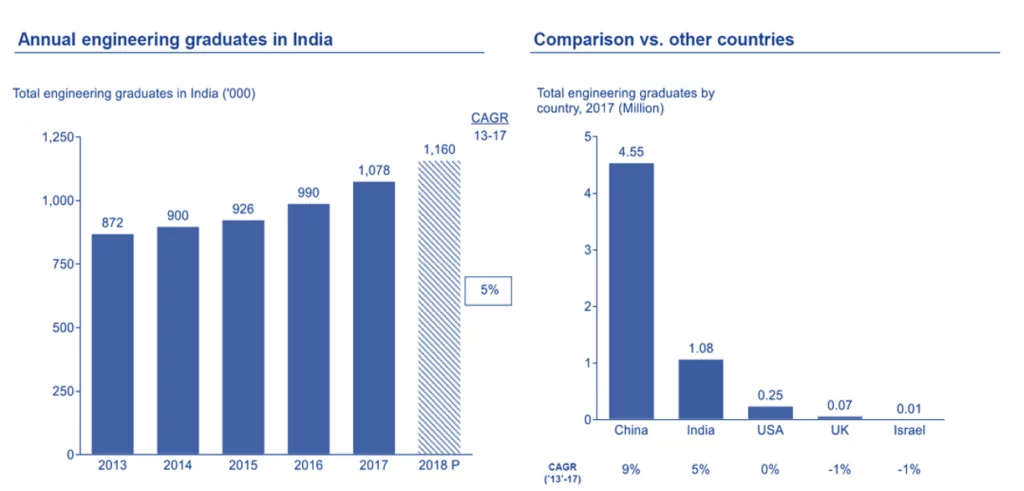
Top 10 Engineering colleges in India 2020 (ranking by the National Institutional Ranking Framework)Indian Institute of Technology, Madras
1. Indian Institute of Technology, Delhi
2. Indian Institute of Technology, Bombay
3. Indian Institute of Technology, Kanpur
4. Indian Institute of Technology, Kharagpur
5. Indian Institute of Technology, Roorkee
6. Indian Institute of Technology, Guwahati
7. Indian Institute of Technology, Hyderabad
8. National Institute of Technology, Tiruchirrappalli
9. Indian Institute of Technology, Indore
Multiple ecosystem enablers contribute to the Indian startup growth story, such as incubation hubs fostering successful startups, co-working spaces simplifying the setup process for startups and collaborative programs with top global ecosystems.
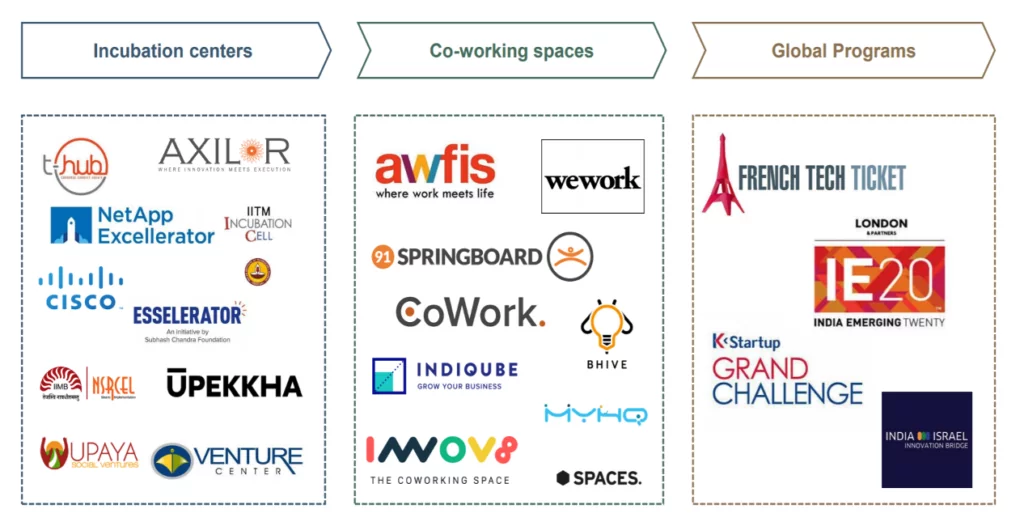
3. Indian Startup Hubs
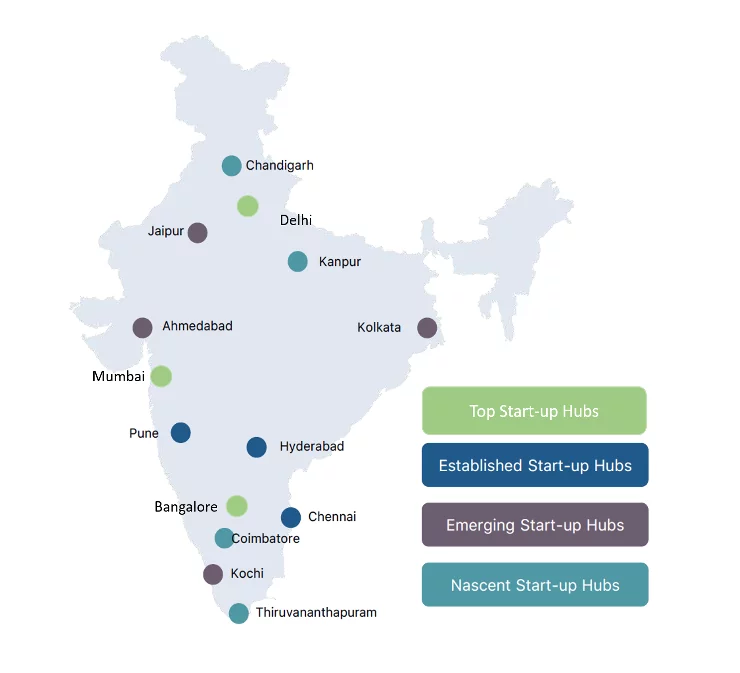
According to Crunchbase, the top startup hubs are as follows:

More and more startups are building technology products in India and targeting both Western and Eastern markets. As of 2019, 21% of Indian startups are primarily focused on markets abroad.
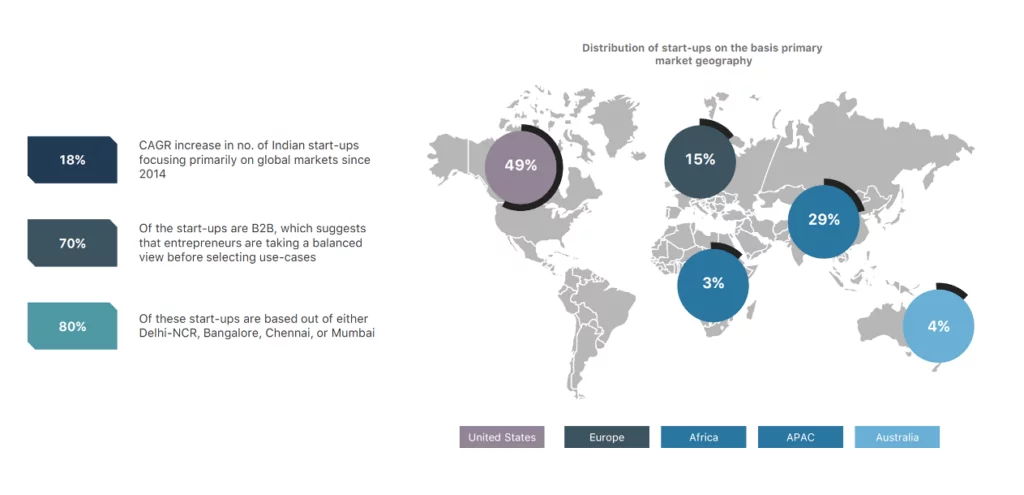
4. Regulatory Framework
The efforts by the government to improve the business environment in India are bearing fruits. In 2019, India ranked 63rd among 190 countries in Ease of Doing Business, up from 142 in 2014. This ranking is likely to improve further in the coming years as India is strongly focused on reforms that directly improve the private business environment and encourage entrepreneurship.
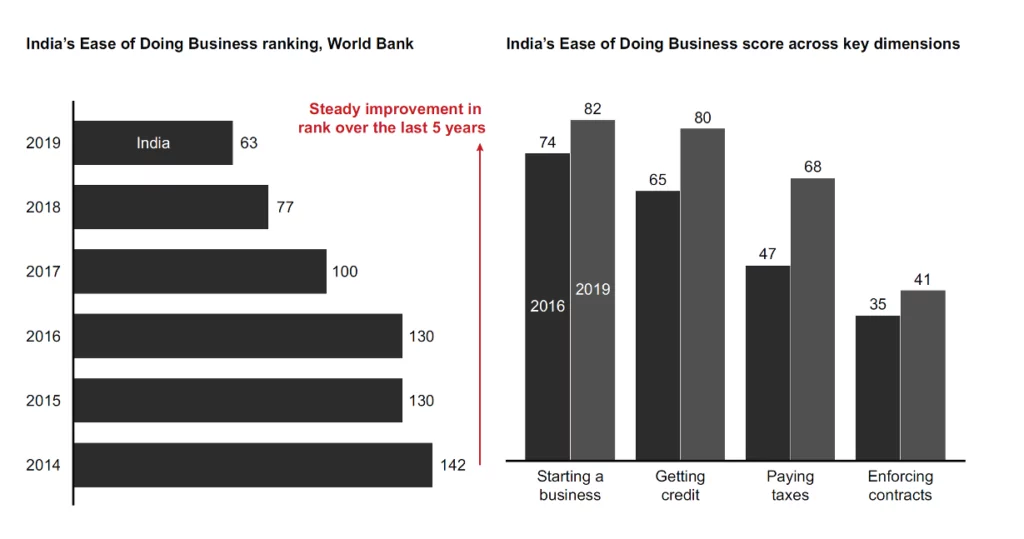
Historically, a high rank in ease of doing business has been directly correlated with high GDP per capital in the long run for other economies. With India moving in the right direction, the results are expected to be along similar lines.
The government introduced several new policy initiatives to improve ease of operating alternative investment funds (AIFs) and startups.
The key initiatives by the government of India are as follows (Source: Bain India Venture Capital Report 2020):
| Startup India | Regulatory program simplifies processes for startupsProcedural simplifications to set up companies; tax waivers incentivise startups and provide incubation assistance and funding to startups. |
| Digital India | Developing digital infrastructure to support digital services to increase penetration of mobile, data and information.Launch of BHIM app to promote United Payment Interface (UPI), multiple apps for farmers like agrimarket and crop insurance app. |
| AIPAC | SEBI’s Alternative Investment Policy Advisory Committee (AIPAC) eases financial regulations for alternative investment funds (includes VC funds)Tax benefits such as pass-through and TDS waivers for VC funds, less stringent angel fund regulations such as reduced lock-in period, permitting up to 25% corpus investment overseas. |
| Atal Innovation Mission | NITI Aayog launched this mission to develop new programs and policies to encourage innovation by fostering sectoral innovation and providing a collaborative platform.Atal Tinkering Labs encourages innovation at institute level, Atal/ Established Incubation & Innovation in micro small and medium enterprises (MSMEs). |
| SIDBI | Aimed at fostering the growth of MSMEs in India through a variety of initiatives including availability of funding.A Fund of Funds for Startups with a corpus of INR 10,000 cr. (~US$ 1.4 billion) for SEBI-registered VC funds, MSME lending through Soft Loan Fund for Micro Small and Medium Enterprises (SMILE) and promotional initiatives like Mission Swavalamban (country-wide entrepreneurship awareness) . |
According to cleartax.in, many benefits are being given to entrepreneurs for establishing startups. A few of the key ones are as follows:
| Simple Process | The Government of India has launched a mobile app and a website for easy startup registration. Anyone wanting to launch a startup can fill out a simple form on the website and upload the required documents. The entire process is completely digital. |
| Reduction in Cost | The government also provides lists of facilitators of patents and trademarks. They provide high quality Intellectual Property Right Services including fast examination of patents at lower fees. The government will bear all facilitator fees and the startup will bear only the statutory fees. |
| Easy access to Funds | A INR 10,000 crore fund was set up by the Indian government to provide funds to startups as venture capital. The government is also giving guarantees to lenders to encourage banks and other financial institutions to provide venture capital. |
| Tax holiday for 3 Years | Startups are exempted from the income tax for 3 years, provided they get a certification from the Inter-Ministerial Board (IMB). |
| Tenders | Startups can apply for government tenders. They are exempted from the “prior experience/turnover” criteria applicable for normal companies answering to government tenders. |
| R&D Facilities | Seven new Research Parks will be set up to provide facilities to startups in the R&D sector |
| No time-consuming compliances | Various compliances have been simplified for startups to save time and money. Startups shall be allowed to self-certify compliance (through the Startup mobile app) with 9 labour and 3 environment laws (for list of white industries which are eligible under self-compliance – click here” ) |
| Tax savings for investors | People investing their capital gains in the venture funds set up by government will get exemption from capital gains. This will help startups to attract more investors. |
| Easy exit | In case of exit a startup can close its business within 90 days from the date of application of winding up. |
Key regulatory revisions (Source: Bain India Venture Capital Report):
- Angel Tax Exemptions granted to Category I (include Venture Capital Funds) and Category II AIFs.
- Just like profits, Category I & II AIFs are allowed to pass- through their losses to limited partners or investors via Finance Bill 2019.
- Encourage AIFs to locate in the International Financial Services Centers (IFSC)
- Capital gains exemption for Category III AIFs setup in IFSC
- 100% tax exemption: For fund managers operating from IFSC for any 10-year block with a 15-year period.
- Dividend distribution tax exemption: Companies and mutual funds exempt from paying dividend distribution tax on meeting prescribed criteria
- Exemption from return filing: For non-residents and foreign companies earning income from Category I and II AIFs set up in IFSC on meeting prescribed criteria.
- Allowance to consider income from the transfer of unlisted shares for VC funds as ‘Capital Gains’.
- Angel Fund regulations relaxed (reduced lock-in period, up to 25% corpus investment overseas, etc)
- Banks permitted to invest in VCs
- Equity/debt investments made by foreign VCs into Indian startups now categorized under the automatic route.
- Exclusion of VC funds in the notification for exemption on long-term capital gains.
- Provision to inform Competition Commission of India if the acquirer has >5% stake in similar enterprises repealed.
Key Policy recommendations address foreign VCs’ concerns (Source: Bain India Venture Capital Report)
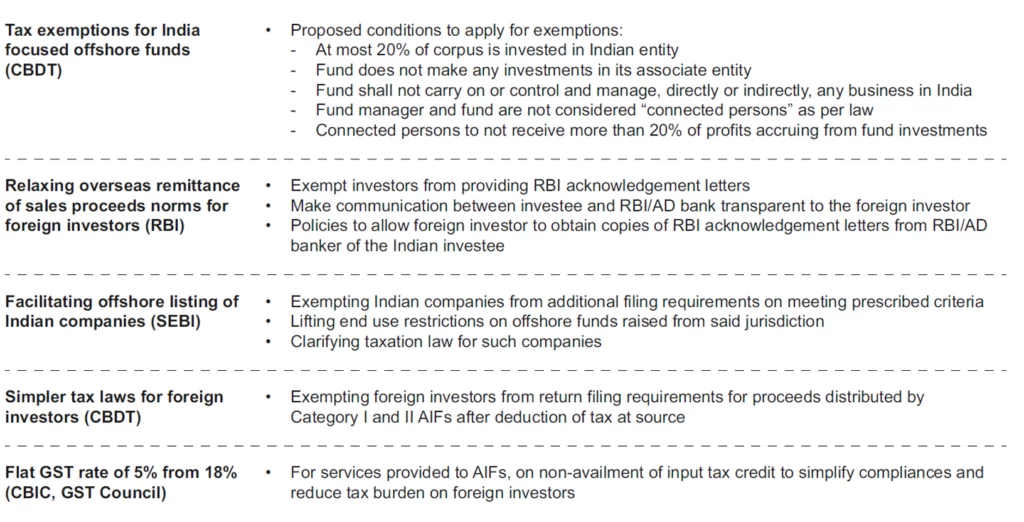
5. Risks & Challenges
To close out this series, I will discuss the risks and challenges when it comes to Venture Capital and doing business in general in India.
There are at least 4 obstacles that are peculiar to the Indian business environment. Even though the Indian Government is enacting serious reforms to improve the startup ecosystem, certain challenges remain as of present day.
1. Building and Scaling an Indian Startup
Building and managing a startup requires several essential management activities such as hiring and managing teams, dealing with customers, and developing strategy. These are in addition to the technical activities required to build products or platforms. Many Indian founders have a technical background but still lack business knowledge.
Additionally, even with increasing venture capital activities, Indian first time founders do find it difficult to raise capital for their business.
2. Diversity and Digital Divide
India is a highly diverse county with plethora of cultures, ethnicities, religions, and languages. Even though it could be advantageous to have diverse population in several aspects, building a pan-Indian company to cater to the diverse needs of the country are many a times difficult.
Moreover, there is often a disconnect between the startup founder(s) and customers. Most start-up founders are well-educated and come from decent background in urban cities. On the other hand, nearly 70% of Indian population live in rural areas. Thus, most of the solutions provided by the start-ups today are targeted at the urban population.
However, the mass market potential customers would come from low-income villages. Due to different living environments, start-ups often have an insufficient understanding of these potential customers and their needs.
3. Low Willingness to Pay
Despite increasing incomes, Indian consumers continue to be price sensitive and have little willingness to pay for products and services. Often customers expect discounts, or buy cheaper versions from China. Therefore, startups face a difficult time in building affordable solutions, which are sometime done at the expense of quality. For this reason, many business in India are volume driven, with marginal returns.
4. Corruption
India was ranked as the 78th most corrupt nation out of 180 countries and territories by the Corruption Perception Index (CPI) in 2018. Doing business in a corrupt country is difficult as there are competing government bureaucracies, unclear and unfair regulatory and taxation systems. India is trying to fight corruption but a lot needs to be done and curbing corruption will likely be a policy agenda for times to come.
Closing Remarks: The Indian startup and VC landscape is fast growing but not yet mature
In order for one to invest in the Venture Capital space in India now, the investor needs to believe in the growth potential of the country for the next 10-15 years (primarily driven by the fact that VC investors are invested in for long term). India is indeed an attractive market for VC investments with evolving consumer behaviours, high tech adoption and increased purchasing power. India is fast-growing yet not matured as a VC market, thus investors can now be part of an exciting evolution story.
Here is a summary of my main findings on India and its VC landscape:
- Large country both in terms of population and GDP, which is growing at a fast pace of 7.2%. Aspiring to become $10 trillion economy by 2030.
- Attractive demographic profile with:
- Average age in 2018: 28; in 2030: 31
- Rising income resulting in higher purchasing power
- Fast-paced urbanization
- Strong adoption of technological solutions with over 1 billion internet users by 2030
- Strong domestic consumer driven ecosystem with increasing momentum in sectors such as e-commerce, health tech, food tech, ed-tech, mobility and fintech.
- Overseas diversification: 21% of Indian startups are focused on overseas markets.
- Relatively mature exit landscape with much higher annual exits, driven by Strategic Sales, Secondaries, and Buyback, when compared to other South (East) Asian countries.
- Strengthening pipeline of potential unicorns with a forecast of 95 -105 unicorns by 2025.
- Intensifying corporate participation in M&A, co-innovation, incubation and support. Supportive regulations and government policies for start-up development and for attracting private investors.
- Proxies: Most of major VCs have their headquarters or offices in India including Sequoia, Accel, Nasper, Matrix, Bessemer
Here you can find part 1 and here part 2 of the three-part series on the Indian VC landscape.
Disclaimer: The views and opinions expressed in this article are those of the author and do not necessarily reflect the official position of Blue Future Partners.
References:
- Bain – Challenges and opportunities emerge as India becomes third-largest consumer market by 2030
- Bain – India Private Equity Report 2019
- Bain – Perspectives on Indian VC Ecosystem, 2018
- Livemint – 52 startups in India are potential unicorns
- Nasscom – Indian Tech Start-Up Ecosystem
- Preqin – Preqin Markets in Focus: Private Equity & Venture Capital in India, March 2019
- Strategy Business – India ́s New Unicorns
- Venture Intelligence – Venture Intelligence Unicorn Tracker
- White Star Capital – SEA Venture Capital Landscape 2020




